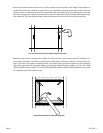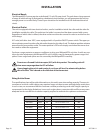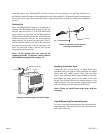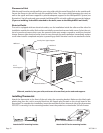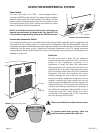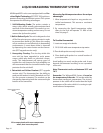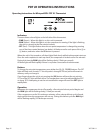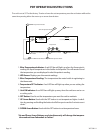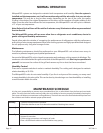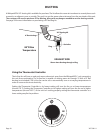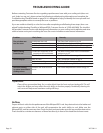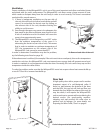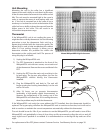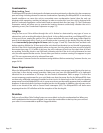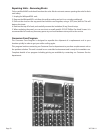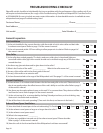
Page 17 XLT 020111
NORMAL OPERATION
WhisperKOOL
systems are designed to maintain both temperature and humidity. Once the system is
installed and the temperature set, it will run continuously until the wine cellar is at your set wine
temperature. This may be as long as three weeks, depending on the size of the room, the quality
(R-value) of insulation, the original temperature of the wine, and the number of bottles residing in the
cellar. Once the cellar has achieved the set temperature, the WhisperKOOL unit will cycle to maintain
±1°F of your set temperature.
Note: Defrost Cycle will turn off the unit for 5 minutes every 90 minutes to allow any accumulated
frost to dissolve.
The WhisperKOOL
system will run more often than a refrigerator or air conditioner, due to its
gentle cooling and humidity maintenance.
People often make the mistake of comparing the performance of refrigerators with the performance
and cycling of wine storage equipment. Wine cellar cooling systems are highly specialized and designed
for one purpose only–long term storage of wine.
Maintenance
The following maintenance should be performed on your WhisperKOOL
unit at least once every six
months to promote longevity and optimal performance.
Vacuum the WhisperKOOL
unit to clean the evaporator and condenser coils to prevent air blockage. The
condenser coils reside behind the grill on the back of the WhisperKOOL
unit. Don’t try to open the unit
yourself. Just vacuum the surface of the grill and remove any lint or dust that has accumulated.
Humidity Control
There are no separate switches in order to maintain humidity. The cooling unit is designed to maintain
relative humidity at 50-70%.
The WhisperKOOL units do not create humidity. If you live in a dry area of the country you many need
to create humidity in the wine cellar. This can be done by introducing a non-heat humidifier, or installing
a small fountain within the cellar.
MAINTENANCE SCHEDULE
Monthly 1. Check for unusual noise or vibration
2. Check the drainline to see if it is above the waterline if draining into a vessel.
Quarterly 1. Clean front and rear intake grilles.
Annually 1. Use a vacuum with brush attachment to clean grilles.
2. Inspect for corrosion.
3. Check wiring connections and integrity of cords.
4. Pour a 50/50 bleach solution into the drainline every spring.
It is the user’s responsibility to remove any accumulated dust, lint, or other debris from the front and rear intake
grilles. This will restrict the airow and may aect the unit’s ability to function properly. Periodically cleaning the
unit’s vents will help assure maximum cooling eciency. The drain tube must also be checked and kept clean and
free of debris and mold to maintain proper performance.



